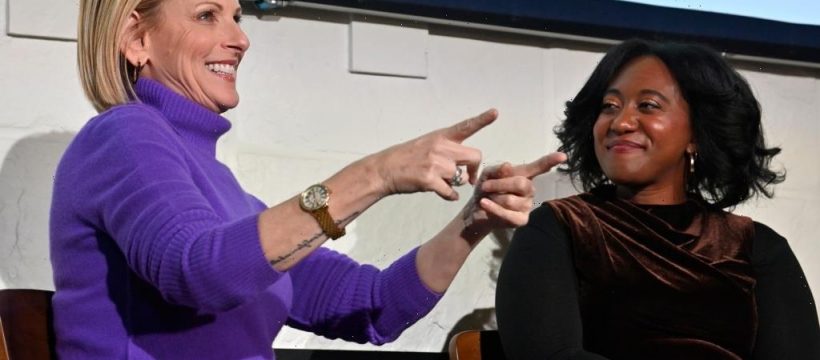A day after Sundance juror Marlee Matlin walked out of the premiere of “Magazine Dreams” in protest, along with the rest of the festival jury, the Oscar winner talked in-depth about the importance of open captions on film. Speaking at the Variety and Stacy’s Pita Chip Rise brunch, an event celebrating female creators on Jan. 21, Matlin passionately advocated for better inclusive storytelling.
When asked about her work on the 2022 best picture winner “CODA” (which swept the 2021 Sundance fest as well), Matlin stressed the lengths her film took to embrace all fans of cinema. “The film was open caption, the entire film, so you couldn’t just turn it off and on,” Matlin told Variety Senior Entertainment Writer Angelique Jackson. “For me, it made me feel very included, because I could sit and watch the film with everyone reacting the same way, the same time, feeling the same emotions. It worked on so many different levels. That’s about ‘CODA,’ and it’s a movie I’m really damn proud of.”
The Friday before this conversation, Matlin was unable to sit with the Sundance audience at the premiere of feature film “Magazine Dreams” after the caption device provided to her failed to work. Variety exclusively reported that in sign of solidarity, all the jurors decided to exit the theater with her to highlight a larger issue regarding the festival’s ability to make movies accessible to all viewers.
In her conversation, Matlin touched on her goals, ambition and her first time directing for television. Towards the end of the discussion, she circled back to her earlier statements about open captioning, underscoring their importance.
“I’m the queen of captions, if you want to know the truth,” she continued. “Captions aren’t just for deaf people. I heard that ‘The Crown,’ which is wonderful, is probably a hard show to understand. So you turn on captions, how many people turn on the captions for ‘The Crown?’… Captions are for everyone, clearly. So I’m continuing to make noise and to spread the message to everyone that it’s crucial to be able to have captions, whatever we’re talking about, everything, on screen.”
“You’re going on a plane and you want to watch a film and I need to watch it with captions. But the airline, for some reason, chooses, and it’s a bizarre reason, what movie you can see with captions, even though they’re already captioned. Not like anybody else who can just choose whatever’s on there, they’ll give us only a choice of 10 out of whatever it is that they may have. So why is it that you are making the decision for us? So that’s just one part of the many things that I have to work on. There’s so much out there.”
Watch the full conversation above.
The Variety and Stacy’s Pita Chip “Rise” event also included two additional conversations: The second panel featured Debby Ryan (“Insatiable”), Algee Smith (“Euphoria”), Grace Byers (“Harlem”), Arianna Bocco (president of IFC Films), Lily Gladstone (“Fancy Dance”) and Karrueche Tran (“Claws”).
The panelists discussed the intricacies of filmmaking and the entertainment industry; each chronicled how they reached the point in their career that brought them to this Sundance panel. “Fancy Dance” actress Gladstone explained while mentoring children she learned that, “People are people and we all have something really important and unique to share and sometimes there’s a camera there to pick it up.” The panelists proceeded to discuss how they approach their craft, whether acting in films and television or acquiring and distributing entertainment.
Ryan elaborated on the daunting aspect of presenting your craft. “You lose yourself so much and find yourself in this whole body of work that so many people have created. But then the public facing element of it is really daunting and sort of confusing and there’s also not a roadmap for that,” she said. Ryan concluded by advising the room to keep it about the work. “Focus on the work,” she said. “If you feel like you don’t deserve to be there, then go deserve to be there. Learn it. Take the class, talk to the person, and if you’re there, be where you need to be.”
Watch the full conversation above.
The final conversation included Stacy Madison, founder of Stacy’s Pita Chips; Nisha Ganatra (director of “Late Night”) and Rhasheda Boyd (vice president of marketing at Frito-Lay) discussing Stacy’s Pita Chips’ first short film, “Rise,” which was also screened at the presentation.
“Rise” sheds light on the struggles women entrepreneurs face today and the fight for progress. The film spotlights three previous winners of the Stacy’s Rise Project: Jocelyn Ramirez, Maria Jose Palacio and Sajani Amarasiri.
Filmmaker Ganatra explained inspiration behind her short, “We thought about what gives you the resilience and it seemed like it all came from our roots. It was roots [that] give us resilience and with resilience we rise. And then we all work together. It was truly a collaborative group of all women that came together to make this film happen.”
Stacy Madison added how a film such as “Rise” has provided the opportunity for not only young women around the world, it shows her own twin girls that women can create their own story. “[‘Rise’] shows that going forward our future can be different and you can do it.” The founder reveled at the idea that her daughters can proceed, knowing there are no longer “certain jobs that are okay for a daughter or a son.” They no longer have to ask the question: “Where is a woman’s place?”
Read More About:
Source: Read Full Article
